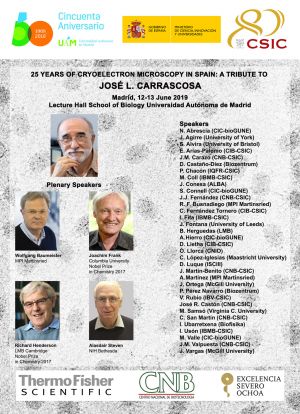José L. Carrascosa
Research professor of Structure of Macromolecular Assemblies at Centro Nacional de Biotecnología (CNB – CSIC).
José L. Carrascosa is considered the father of cryoelectron microscopy in Spain. In the last 25 years, his research group has contributed to the development of microscopy through the use of correlative microscopy by integration of electron tomographic methods with other microscopies, in particular the cryo-tomograms of cells infected with Vaccinia virus obtained by X-ray microscopy elucidating previously unreported quantitative aspects of viral maturation and compartmentalisation. They have also studied the interaction of magnetic nanoparticles and eukaryotic cells to exploit the possibilities of combined X-ray microscopy and analysis. The development of an approach that uses X-ray spectroscopy and tomography helped them to correlate the topological studies of cellular distribution of nanoparticles with the chemical quantitative information of metal uptake by cells.
José L. Carrascosa’s group is focused in the study of macromolecular nanomachines that carry out defined biological functions, particularly the molecular bases of assembly and maturation in viral systems. By studying of virus assembly, the chemical and functional properties of macromolecular interactions of the complexes assembled gives information of the morphogenetic pathway of virus construction. His group combines cryo-electron microscopy and computer three-dimensional image processing to obtain structures involved in bacteriophage T7 assembly. They have solved two conformations of the DNA packaging motor complex as well as several structures related to the DNA ejection complex to obtain a detailed description of the DNA translocation process involved in the virus life cycle. Some components of these viruses (connector, terminase) are presently being used in synthetic environments to obtain delivery vehicles with improved specificity and efficiency.






